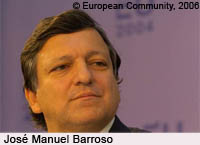Barroso outlines four principles for EU-Japan 'knowledge cooperation'
President of the European Commission José Manuel Barroso outlined four principles for bringing about a joint EU-Japan 'knowledge cooperation' during a speech at Kobe University on 22 April: increased political cooperation; open cross-border cooperation in research and development (R&D); stronger bilateral ties; and establishing networks. Mr Barroso noted that Japan is facing many of the same challenges as Europe: 'an ageing population, external competition, reconciling economic growth with environmental and social protection, the absence of natural resources'. 'The solutions we have chosen - economic reform and prioritising technology - have much in common. Given these commonalities, and that Japan is such a like-minded country, couldn't we both benefit from working together more often?' asked the Commission President. The EU's desire to collaborate more closely with Japan 'holds true across the board [...]. But it is particularly true in the field of science and technology,' said Mr Barroso. Political cooperation between the EU and Japan has, for some time, been weaker than economic cooperation, said Mr Barroso. 'When we consider how much we have in common and how similar are our approaches, this makes no sense,' he said. Calling for increased cross-border R&D cooperation, the Commission President emphasised that national protectionism is not a viable strategy for research, and that the cost of cutting-edge research and infrastructure is too high to be borne by individual countries. He cited marine, atmospheric and environmental research as fields in which cooperation is necessary, and also pointed to the International Thermonuclear Experimental Reactor (ITER) project, in which both the EU and Japan are partners. Concluding negotiations on the EU-Japan science and technology agreement would go a long way to strengthening bilateral ties, said Mr Barroso, and joint networks would help both parties to convert the results of increased cooperation into practices and products. 'For two partners like the EU and Japan, technology is the key to the future, and working together is vital. We need to give our relationship a new dimension - knowledge cooperation,' Mr Barroso told his Japanese audience.
Countries
Japan



